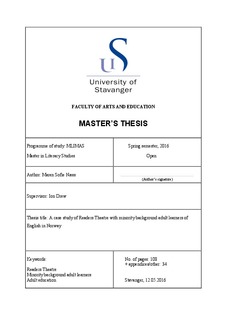| dc.description.abstract | This thesis is about the implementation of Readers Theatre (RT) in a minority background adult learners’ class of English at an adult education centre in Norway. RT is a group reading activity where the students rehearse scripts that are eventually going to be performed. The aim of the research was to gain insight into these learners’ experiences of RT and to investigate the possible benefits and challenges of this method with the group in question.
The subjects in this study were adult minority background learners following the 10th grade curriculum since, for various reasons, they had not completed their lower secondary education in their home country. Two cycles of RT were implemented in the class. In the first cycle, the students were provided with pre-written scripts, whereas in the second cycle the students created personal scripts.
Qualitative research methods were used in the research. Interviews were conducted with the teacher and four of the students. In addition, the researcher observed the rehearsals and performances of the two RT cycles. In both cycles, the first rehearsals and performances were audio-recorded, which allowed the researcher to measure the students’ improvement in fluency, pronunciation, and word recognition.
The findings of the research showed that RT was a relatively successful method with the students. Both cycles of RT, the pre-written scripts and the self-written scripts, functioned well in the context. This applied especially to the personal scripts, as the students were eager to share information about their own home countries and their backgrounds. The students enjoyed working with RT and the performances boosted their confidence. The performances were also a valuable experience for these students as they had very little experience with any form of public speaking in their home country. In addition, the audio-recordings showed that RT had improved the learners’ fluency, pronunciation and word recognition in English.
The students’ motivation to read beyond the RT activity itself did not seem to increase as it has with studies of younger learners. Various aspects of RT motivated the students, but it did not seem to have a motivational effect on the students’ reading habits beyond the actual process, a finding which contrasts with previous studies on RT. Based on the interviews it seems as if the students’ motivation to learn English was primarily instrumental, e.g. getting a certificate of lower secondary education and functioning within the Norwegian society.
One of the challenges in the research was that some of the students were occasionally absent, which disrupted the flow of the rehearsals. The logistical challenges included finding appropriate scripts, creating groups, and assisting all the groups when they were often practising in separate rooms.
This research has contributed to the research on RT with its particular focus on minority background adult learners. The group represented in this research distinguishes it from earlier studies, which have primarily been conducted with young learners. Furthermore, most of the research on RT has been conducted in L1 contexts, and less in L2 or L3 contexts. Finally, unlike other studies, this research has also explored the way that personal scripts were a beneficial variant of self-written scripts used for RT. | nb_NO |
